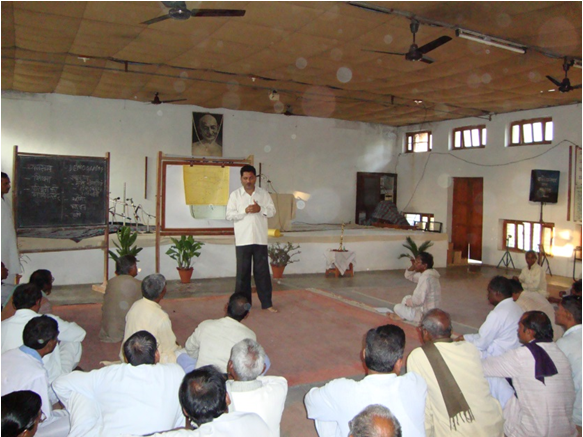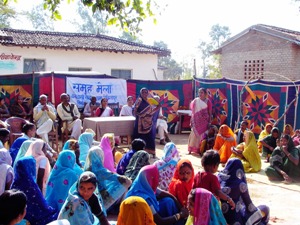AGRINDUS: Human Resource Development for Gram Swaraj

A training program at Ashram premises

Training on cattle vaccination
Funding Agency: Bread for the World- The Protestant Development Services, Berlin
Period: 2007-2012
This was the last phase of an ongoing series of projects funded by Bread for the World -The Protestant Development Services, Berlin, since 1977. The major aim of this phase of the project was development of capacities for the staff and the functionaries, men as well as women, for village development. In particular, increasing participation of women in the development process was one of the main objectives. Other important goals set for this phase were as follows:
• Encouragement of entrepreneurship by provision of training and other support for entrepreneurship
• Orientation of the village youth to life situations
• Promotion of health culture
• Support service for environmental health and legal aid
• Extension of Gram Swaraj work to other areas through volunteer youth groups
For effective implementation of Panchayat Raj, multiple Vikas Manch (development forums) had been formed earlier in 2005, each one for a group of five to six villages. Each forum consisted of one Swaraj Sathi (a volunteer who assists in legal and local government related matters), one Swastha Mitra (health guide), a Gram Sakhi (a women volunteer for creating awareness among the women) and one Pashu Palak (a volunteer guide for animal rearing). At the Vikas Manch level, training was imparted to the forum members on
(a) animal husbandry and inoculation
(b) health and hygiene
(c) legal and government related matters (new Van Adhikar act, social audit, dealing with MNREGA related problems) and
(d) management techniques (such as participatory rural appraisal).
In the initial phase, master trainers were trained and oriented in the training sessions / workshops organised in the Ashram campus. Trainers for new skills and techniques were invited from other institutions / organisations. In the later part of the project, the master trainers trained the functionaries and the craftsmen at Development Forum level. The new skills acquired were transferred to the communities by the village level functionaries. A three tier system was used for regular dissemination of information: through reading rooms at the development forum level, with small number of relevant reading books and supplementary material, through libraries at the village development centres and through a reference library at Agrindus Institute in the Ashram. A major outcome of this project is trained volunteers at the village level. They have started taking initiatives on different local issues related to development, rights and justice.
